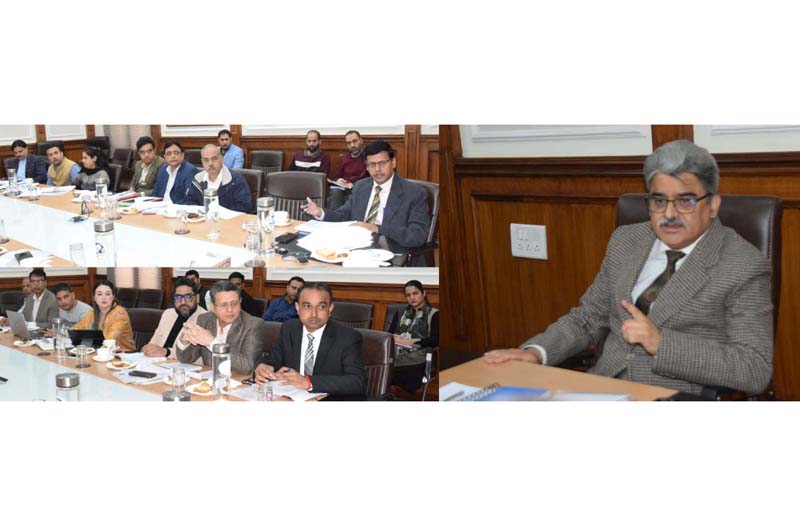Excelsior Correspondent
JAMMU, Dec 1: Chief Secretary Atal Dulloo convened a comprehensive meeting of the Department of Disaster Management, Relief, Rehabilitation & Reconstruction (DMRR&R) to evaluate the strategies implemented for disaster mitigation in J&K.
Attendees included the Principal Secretary of Home and DMRR&R Departments, the Divisional Commissioners from Kashmir and Jammu, the Relief Commissioner, along with other relevant officials from the Department.
Dulloo emphasized the need for the Department to intensify efforts in formulating action plans addressing the various disasters that the UT may encounter. He called for the Emergency Operation Centre (EOC) to be operational by the end of this fiscal year, highlighting its critical role during disasters.
He stressed the importance of expeditions aimed at studying Glacial Lake Outburst Floods (GLOF) by examining various mountain lakes in the region. Additionally, he advocated for training programs for students and volunteers to improve their capacity for participation in relief operations.
The Principal Secretary of DMRR&R, Chandraker Bharti, briefed attendees about a variety of activities and milestones, including the bolstering of UT, Divisional, and District level disaster management authorities through the deployment of essential personnel.
Bharti also reported that the Disaster District Management Plans (DDMPs) for the fiscal year 2024-25 for all 20 districts have been updated. Specific action plans for hazards, such as Heat Wave Action Plans and Flood Management Action Plans, have been established, and a Cold Wave Action Plan is in development alongside the Landslide Management Plan.
He further mentioned that a temporary EOC has been set up in Srinagar, with plans for a permanent facility to be constructed in Ompura, Budgam.
The Department has also initiated the Emergency Response Support System (ERSS), featuring a toll-free contact number, 112, for reporting disaster-related calls.
Other initiatives under discussion included the Common Alert Protocol (CAP), which integrates alert-generating agencies such as IMD, CWC, INCOIS, DGRE, and FSI to relay disaster alerts through platforms like TSPs, TV, Radio, Cable TV, Social Media, Indian Railways, and Coastal Sirens. A total of 118 alerts have been disseminated to date, as noted in the meeting.
Additionally, a presentation was delivered regarding the benefits and planned measures for the welfare of various categories of migrants from the Kashmir and Jammu divisions.
The meeting thoroughly discussed the status of 6000 transit accommodations for Kashmiri Pandit employees under the PM Package, along with the recruitment of the remaining designated positions.
It was revealed that these migrants are being included under the National Food Security Act (NFSA) to provide social security benefits such as old age pensions, widow pensions, Ayushman Bharat, and access to self-employment and skill development opportunities.
The meeting also acknowledged the progress of outreach campaigns aimed at including PoJK and other West Pakistani Refugees (WPRs) under the Rehabilitation Package allocated for them.
Further, developmental initiatives like the establishment of ‘PoJK Bhawan’ in Suketar and a Community Hall in Jagti were also reviewed.


Leave a Reply